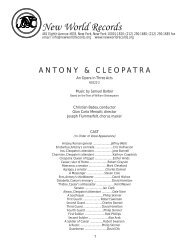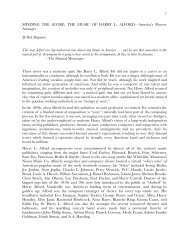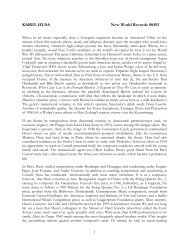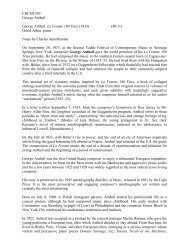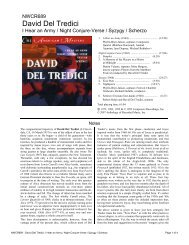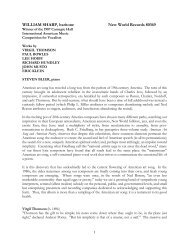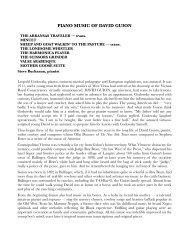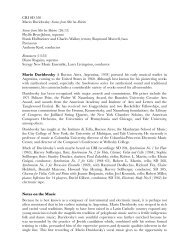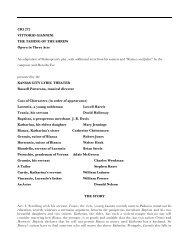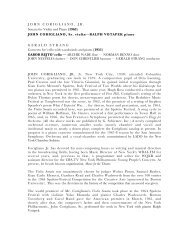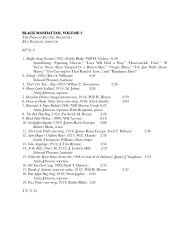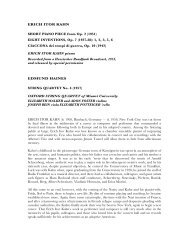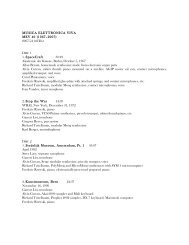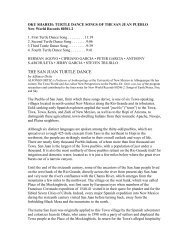Brother, Can You Spare a Dime? - New World Records
Brother, Can You Spare a Dime? - New World Records
Brother, Can You Spare a Dime? - New World Records
You also want an ePaper? Increase the reach of your titles
YUMPU automatically turns print PDFs into web optimized ePapers that Google loves.
Gershwin’s first published song, “When <strong>You</strong> Want ’Em <strong>You</strong> <strong>Can</strong>’t Get ’Em,” was<br />
written when he was only seventeen; his first stage song, “The Making of a Girl,” was<br />
sung in The Passing Show of 1916; his first full-length musical, La, La, Lucille, opened<br />
in <strong>New</strong> York in 1919; by 1924 be had written music for five annual installments of<br />
George White’s Scandals. He was clearly an enormously talented songwriter from the<br />
beginning of his career, and by 1929 he had written dozens of successful songs. Many of<br />
these were lively, catchy tunes drawing on ragtime and early jazz rhythms; an example is<br />
“Fascinating Rhythm.” Though Gershwin continued to write songs of this sort during the<br />
Depression, his talent matured and mellowed, and almost all his famous ballads were<br />
written in the last eight years of his life: “Embraceable <strong>You</strong>,” “They <strong>Can</strong>’t Take That<br />
Away from Me,” and “Love Walked In,” for example.<br />
These are Depression-era songs, and not only because they belong to that period<br />
chronologically. Gershwin’s songs are seldom topical, but he somehow caught one of the<br />
moods of America in his lyrical, often wistful and sentimental creations. They offer not<br />
pure escapism but momentary retrospection, a beautiful reminder of the sort of human<br />
relationship that most people had either experienced or hoped to experience and that<br />
could make the external events of the world unimportant—at least temporarily. And there<br />
was Porgy and Bess (1935), whose portrayal of the lives of a group of blacks in<br />
Charleston is a sympathetic and memorable sketch of Americans facing hardship and<br />
deprivation with humor, courage, and dignity. Though Gershwin was insulated<br />
financially from the difficulties facing so many Americans, he nevertheless sensed and<br />
captured something of the spirit of the country in those dark days in a way that few other<br />
songwriters ever matched.<br />
“Love Walked In” was written for the film Goldwyn Follies (1938); the lyrics, as in most<br />
of Gershwin’s songs, are by his brother Ira. Kenny Baker had a leading role in the movie,<br />
and this was one of his first recordings. He had made his first film in 1935, and one of his<br />
more memorable roles was in the Marx <strong>Brother</strong>s’ A Day at the Races; he made his<br />
Broadway debut in 1943 in One Touch of Venus.<br />
On the Good Ship Lollypop<br />
(Sidney Glare and Richard A. Whiting)<br />
(From the film Bright Eyes)<br />
Shirley Temple, with studio orchestra; from soundtrack of film. Recorded 1934, in<br />
Hollywood. Originally issued on Fox 3006.<br />
Child stars were popular almost from the beginning of movies. Mary Pickford was the<br />
first, appearing in 1909 in a series of short films by D. W. Griffith and following with<br />
major roles in silent feature films; Jackie Coogan was a star from his appearance with<br />
Chaplin in The Kid (1920). But the Depression years were the heyday of child stars.<br />
Freddie Bartholomew, Judy Garland, Jackie Cooper, Bobby Breen, Baby Leroy, and Jane<br />
Withers are merely the ones who come most quickly to mind.



